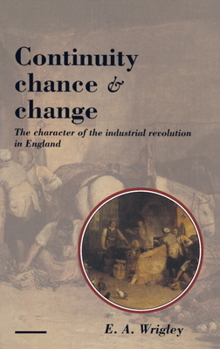Continuity, Chance and Change
Select Format
Select Condition 
Book Overview
The Industrial Revolution brought into being a distinct world, a world of greater affluence, longevity and mobility, an urban rather than a rural world. But the great surge of economic growth was balanced against severe constraints on the opportunities for expansion, revealing an intriguing paradox. This book, published to considerable critical acclaim, explores the paradox and attempts to provide a distinct model' of the changes that comprised the industrial revolution.
Format:Paperback
Language:English
ISBN:0521396573
ISBN13:9780521396578
Release Date:November 1990
Publisher:Cambridge University Press
Length:156 Pages
Weight:0.44 lbs.
Dimensions:0.5" x 5.5" x 8.4"
Customer Reviews
1 rating
Cogent and up-to-date
Published by Thriftbooks.com User , 15 years ago
The industrial revolution is, surprisingly, a cutting edge historical subject. Views on it are being revised constantly, especially based on newly-computed economic and demographic data. In particular, notions of a dramatic shift compressed in the 1780-1830 period have now been dismissed in favour of longer-term up-trends. Received wisdom on pre-industrial extended families and early marriage has also been dispelled, and the nuclear family shown to have been the rule long before. Wrigley's short book, or long essay, is a well-articulated statement of the factors behind the industrial revolution. His theory is that it consisted of two separate phenomena: the perfection of an advanced organic economy and a shift to a mineral-based energy economy. That these were coincidental is shown by comparison with the Dutch economy, which ceased growing in the eighteenth century. Organic economies were bounded because of competition for land resources: raw materials such as wool, charcoal for heating and industry, fodder for animal power, food. Gains could be achieved through trade, investment, and specialisation, but marginal returns would decrease as pressure grew on the land. Mineral energy, namely coal, enabled these limits to be overcome, though it only became dominant as a factor in the early-to-mid nineteenth century (with the steam engine and railways). Wrigley's position, though conceptually original, remains based on up-to-date empirical work by other historians. His book is short and does not purport to contain exhaustive data on the industrial revolution, or even an exhaustive analysis. But it is convincing (his analysis squares impressively with the otherwise baffling pessimism of classical economists such as Ricardo or even Adam Smith) and an excellent introduction to the topic.






